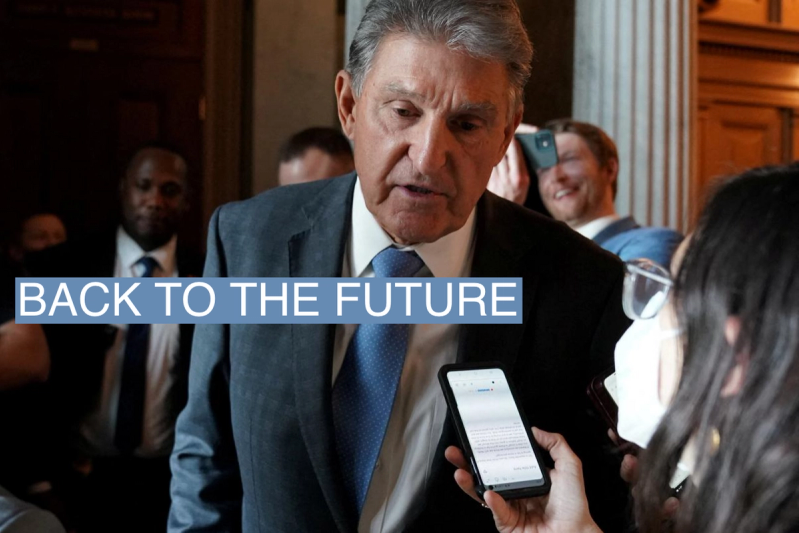The News

With Democrats and Republicans potentially headed for a collision over the debt ceiling, one critical lawmaker has already begun talking about a familiar offramp.
It’s time, says Sen. Joe Manchin, for a blue-ribbon commission on how to fix the federal budget.
Feeling deja vu? Creating a grand “super committee” on the deficit was a big part of the agreement that helped resolve Congress’s 2011 debt ceiling standoff. The panel notoriously failed to agree on a solution — triggering the unpopular broad spending cuts known as sequestration that were put in the debt ceiling bill to spur them to a deal. That era also saw the much heralded Bowles-Simpson deficit commission end at an impasse.
But Manchin says it’s time to give the idea another spin. After meeting with House Speaker Kevin McCarthy on Wednesday, he said the GOP leader was “receptive” to the idea of calling a bipartisan panel on how to make spending more “effective,” according to Politico. (He told the publication McCarthy himself hadn’t singled out any specific spending cuts he wanted, other than “fraud, waste, and abuse.“)
He’s also been talking up the bipartisan TRUST Act that he co-sponsored with Utah Sen. Mitt Romney, including on a Fox Business interview last week.
The bill would create Congressional committees, with members split evenly between the two parties, tasked with finding ways to bolster the dwindling trust funds that support Medicare and Social Security. Their proposed fixes would get a fast track to a vote in the House, but still need 60 yea’s to pass the Senate. Unlike in 2011, there’d be no automatic budget cuts if the commissions deadlocked.
The White House has so far insisted that it won’t negotiate on the debt ceiling with Republicans, who’ve said they want unspecified spending cuts in return for a hike. Manchin is the most prominent Democrat to break ranks and urge talks.
Some GOP lawmakers are open to his pitch — though it’s unclear how many would be satisfied with trading a debt limit hike for a commission alone.
Rep. Dusty Johnson, R-S.D., told Semafor that it was “a wonderfully innovative idea” that should be on the table. Romney told reporters on Monday that the TRUST Act “could certainly” form part of an agreement to end the current standoff. However, he cautioned that only establishing fiscal committees “would be insufficient to get the deal done.”
At least one veteran of fiscal commissions past is on board with the concept too — though he’s keeping his expectations in check.
“That’s obviously something that I personally think would be a good idea to look at,” Sen. Mike Crapo, the Idaho Republican who served on the Bowles-Simpson commission, told Semafor. He acknowledged that commissions might end in failure again, but added: “We have to try difficult things here.”
In this article:
Joseph’s view
A fiscal commission may represent an escape hatch for House Republicans, who have been having enormous difficulty coalescing around one spending plan.
House GOP lawmakers are loath to cut defense spending, which makes up roughly one-sixth of the federal budget. And more are vowing to shield Social Security and Medicare from spending cuts. They’re realizing anew that actually taking a knife to the budget requires making decisions many aren’t ready to make. When reporters asked Manchin Wednesday whether McCarthy had talked about any particular budget cuts, he said: “There’s nothing specific. Waste. Fraud. Abuse.” A commission would offer a handy fig leaf.
Room for Disagreement
Not everyone is thrilled about repeating this very 2010s exercise. Rep. Nancy Mace, R-S.C, told Semafor that “we have lots of committees that already can handle” making cuts to the federal budget. “We’ve got to have a conversation, Republicans and Democrats alike, and get this under control,” she added.
Others want to turn the conversation away from entitlement programs entirely and towards different categories of spending . “That to me is a longer-term discussion,” Sen. Mike Braun, R-Ind. told Semafor when asked about programs like Medicare and Social Security. For those lawmakers, something like the TRUST Act may be more a nuisance than a convenient out.

